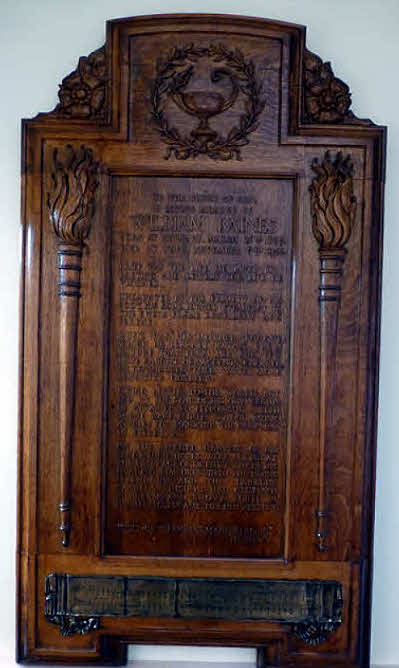A young composer’s life cut short
Walking up the hill from the Calder & Hebble Navigation in West Yorkshire I arrived at the pretty town of Horbury. Once a thriving woollen town and railway waggon building centre on the fringes of the Yorkshire coalfields. Several notable people were born here including the 18th century architect John Carr. It was also the birthplace of the hymn Onward, Christian Soldiers, and of the pianist and prolific composer William Baines. William was born in 1899 – the same decade as the likes of Arthur Bliss, Herbert Howells, Peter Warlock and Gordon Jacob. But his life was to be tragically cut short at the age of just 23.

Tracking down the modest terraced house at No. 11 Shepstye Road where he was born on
26 March 1899 there is a proud blue plaque over the porch. The Horbury Civic Society has done an excellent job of marking the birthplaces and residences of many well know and lesser known figures across the town. Even in the very same street where Baines was born there are plaques to the author and playwright Stan Barstow (1928-2011), and the composer, conductor, band leader and soloist Angus Holden (1872-1921).
Baines grew up surrounded by the eclectic world of his father whose activities ranged from bricklayer’s labourer to being organist at the Primitive Methodist Chapel as well as a cinema pianist. William studied at the Yorkshire Training College of Music in Leeds before the family moved to York in 1917. Here William and his father both worked as cinema pianists and William gave public piano recitals which were to include many of his own compositions.
If he had lived might William Baines have become one of the great British composers of the 20th century?

He completed around 150 works before he died, mostly piano miniatures and many with descriptive titles. Many of these are technically advanced and are said to show the influence of composers such as Scriabin (Baines had large hands!).
His best known composition is probably Goodnight to Flamboro’, named after the Yorkshire Promontory, Flamborough Head. His Seven Preludes from 1919 are considered to be amongst his finest compositions. He also wrote orchestral pieces and chamber music including a String Quartet, a Piano Trio and a Violin Sonata.
In 1920, Dr Eaglefield Hull, founder of Huddersfield College and the first British Musical Society wrote enthusiastically about William Baines declaring him ‘a genius’. This triggered almost daily invitations for concerts, publishing enquiries and interviews from reporters.

However, his health took a serious turn for the worse. Baines had always suffered from delicate health and On 7 May 1918 he wrote: ‘Last night I felt very ill – I describe it best as a sort of general weakness.’ He was called up for ‘light clerical duties’ towards the end of World War I but after just a fortnight in the cold, wet, influenza-ridden camp at Blandford Camp in Dorset he was hospitalised with septic poisoning. His health never fully recovered. He made several visits to Bridlington over the next few years for the benefits of the sea air before he died on 6 November 1922 of abdominal tuberculosis.
His funeral took place at Horbury Primitive Methodist Chapel where an oak memorial tablet was placed . After the demolition of the chapel, the plaque was re-housed in the Methodist Church next door, where it remains today.
Written by Nicholas Keyworth

